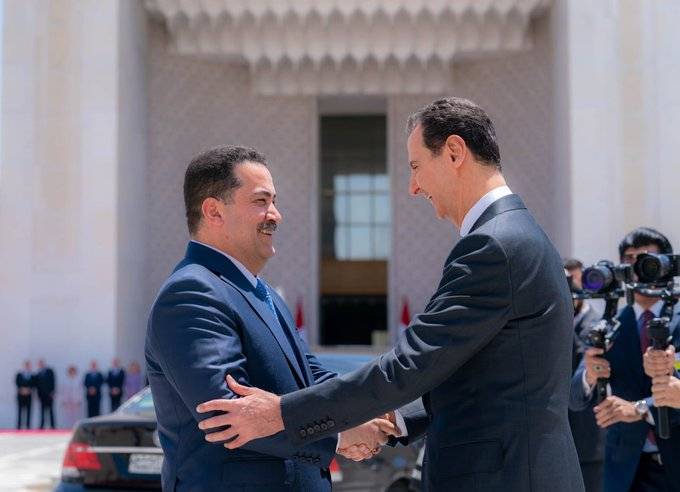Iraqi Prime Minister Mohammed Shia' Al-Sudani began his official visit to Syria today, Sunday, marking the first such visit since the outbreak of war in 2011. The trip aims to secure their shared borders and enhance economic relations. Iraqi Prime Minister's Foreign Affairs Adviser Farhad Alaaeddin stated that Al-Sudani intends to address the fight against drug trafficking, particularly the amphetamine Captagon, and to prevent the infiltration of Islamic State militants across their approximately 600-kilometer shared border.
Additionally, the Prime Minister will discuss commercial and economic cooperation and ways to reopen a pipeline for oil exports to the Mediterranean, which could help Iraq diversify its export routes.
Syrian President Bashar Al-Assad received Iraqi Prime Minister Mohammed Shia' Al-Sudani with an official reception at the People's Palace.
The discussions between Assad and the Iraqi Prime Minister, with the presence of delegations from both countries, focused on bilateral relations and enhancing cooperation in various fields including trade exchange, transportation, industry, and ongoing coordination in various political issues, in addition to joint efforts in combating terrorism.
In a joint press conference with Iraqi Prime Minister Mohammed Shia' Al-Sudani, Assad welcomed the visit, emphasizing its importance due to the deep ties between the two brotherly peoples, considering this visit an opportunity to build institutional relations and achieve significant progress in bilateral cooperation between the two countries.
He noted, "For us in Syria, Iraq's identity will remain an authentic Arab one, and I wish the Iraqi people more advancement and prosperity." Assad also pointed out that "bilateral economic relations will be a focal point of discussions later, reflecting positively on both countries and alleviating the blockade imposed on Syria."
For his part, Iraqi Prime Minister Mohammed Shia' Al-Sudani thanked Assad for the "invitation to visit Syria, stating that the security and stability in both countries drive further bilateral coordination in facing mutual challenges."




